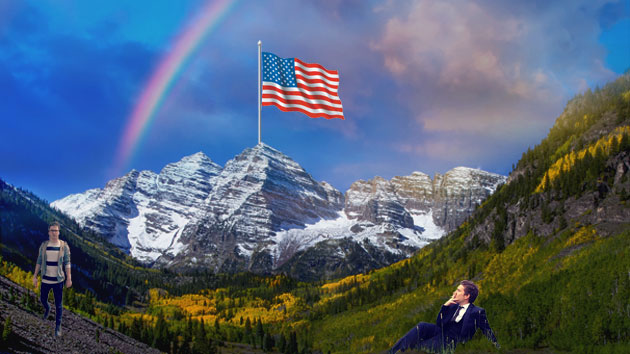
A gay Australian and straight American talk about what they love about the United States.Thinkstock/twildlife, Thinkstock/Biletskiy_Evgeniy and Shutterstock/Sarunyu_foto
James West: Okay. How to start. How to start?
Ben Dreyfuss: July 4th! America! That great American holiday wherein we celebrate some bit of the American story. I think the earliest bit. Or the earliest official bit? We aren’t celebrating the stuff with the Mayflower.
JW: So the idea is we’re chatting about what makes this holiday so great for Americans and America and by extension the world, because for Americans: America is the world. It’s a bit off-brand for Mother Jones, no?
BD: You could say that, yes. We don’t have a lot of stories called “America Is Great.”
JW: It’s usually: “America: It’s Far Worse Than You Think ” or “America: Get Out. Seriously, Get Out While You Can.”
BD: But you can’t be critical all of the time or you’ll have an aneurysm. So let’s talk about the truth of the thing, which is that we actually love America! We’re harsh and critical about it, but that’s because we love it so much. We wouldn’t bother writing these stories that urge it to be better if we didn’t have some deep abiding love for it.
JW: I mean, I love America more than is reasonable, because I left a sun-soaked beach paradise with universal health coverage and a social safety net to move to this rat-infested fuckshow called New York City. But anyway, I’m going to start with a simple question. What is your favorite thing about America? FIRST THING that comes to your mind.
BD: Blue jeans. I think blue jeans are amazing. I also love Hollywood and rock & roll. Blue jeans and Hollywood and rock & roll won the cold war.
JW: Blue jeans, when they’re not made by children in Asia.
BD: Well, even then we invented them. “Guess” may make them in Asia but those kids are playing an American song.
JW: “Designed in California” is how Apple describes that particular phenomenon.
BD: Apple! Right, that’s another cool thing America has. Innovation! Other places have that too, though.
JW: Innovation is one thing I think America excels at quite legitimately and can lay claim to (despite lack of diversity hires.) Have you tried to use 3G in the UK? It’s awful. And all their websites break when you try to book a ticket to see Jurassic World 3D. The internet is basically America. At least in the Anglophone world.
BD: That’s true, but in their favor they did invent radar.
JW: Jurassic World 3D, by the way, is an American film, made by Americans.
BD: American films are the best films. This is a fact. Cinema is—along with Jazz—the great American art form.
JW: I think that’s a fact, too. I mean, what is the comparison? French films? I don’t think so. Bollywood? Bollywood is great. But very long films.
BD: And cinema in a very real sense created the American identity that has been exported around the world. For instance, would blue jeans be as important had not James Dean worn them? The French films are all very…well, French. Great! But arty to the point of being intentionally obtuse.
JW: British films are all set in a kitchen making tea… why is that? And Keira Knightley is in every single one of them.
BD: Have you seen the Eddie Izzard bit on the differences between British and American films?
BD: British films are all “room with a view and a staircase and a pond.”
JW: Now I’m in an Eddie Izzard YouTube K-hole.
BD: “You fuck my wife? You fuck my wife?” “I am your wife!”
JW: Okay, now I’m going to stop this.
BD: One thing I think he gets at in this discussion of the size and expanse of American films is the thematic size and expanse of the American ideal, right?
JW: Big, brash, uncompromising, and designed to sell you food made out of corn served in containers made of corn, in seats made of corn.
BD: You had this ridiculous frontier mentality in the 18th century. Then you have the moon looming large in the 20th century. There is this idea that you can do anything in America! Even though this isn’t true and the poverty trap here is as terrible as anywhere, it’s still baked into the pitch. You came here from Australia. Did you get that growing up?
JW: I think what most Australians refuse to really admit is that we are far more similar to Americans than we are to the British. Same frontier thing, same sense of upward-mobility (as a sometimes-flawed, problematic) national obsession, same sense that given the right circumstances everyone can achieve greatness. (Though in Australia’s case, not too great, otherwise you’re arrogant, “like an American.”)
BD: Haha right. “Arrogant like an American” is a very British thing. You still have traces of British in you.
JW: It’s tactical! America loomed large—and continues to loom the largest for Australians, I think. My childhood was drenched with all the cultural products your childhood was.
BD: Nationality was—and is—far less a divide than age… because “everything is global, man!”
JW: If I dusted off my Marxist undergraduate degree I would say something about the spread of global capitalism and America’s imperialist soft power. But that’s kind of boring, isn’t it. Plus, I love America.
BD: Right, I mean we’re going to get into the Bad Bits later. We are liberal journalists, after all.
JW: And if there’s any country’s soft power I would want, it’s America’s, on balance. I mean, Scandinavian furniture is really nice, and better than American, but they aren’t a superpower. But given the choice of current superpowers, I would throw my chips down for America. Also, New York hosts the UN, man, and it’s a beautiful building full of august (ineffective!) debate about the future of the planet!
BD: And Hillary Clinton wasn’t afraid to announce her run for president in front of it!
JW: No. That was bold.
Clinton Launches Campaign Next To One World Government Headquarters pic.twitter.com/d0biyOJaov
— Ben Dreyfuss (@bendreyfuss) June 13, 2015
BD: That was great. I think a lot of people—myself included—think of America as a leader of the world, right? But what Hillary was saying with that backdrop was that we’re a leader sure, but still a member of this global community. And that’s true and important and when America acts like its worst self on the global stage is when we forget that.
JW: I’ve been doing some thinking about this question, and I want to get sentimental for a second about America. Are you ready?
BD: Yes.
JW: America got a really bad wrap in recent years around the world for obvious reasons. And it made people kind of…”bigoted” against Americans. Certainly there was this feeling that American culture is crass, debased, somehow inferior. But actually I’ve only ever found the opposite: a culture that is genuinely open to people and ideas, in the pursuit of creating something cool. In my case, writing and videos. But there’s never any hesitation to welcome an idea in any field, from my experience. Americans are natural storytellers, and therefore natural listeners, alert to things and excited by them. That’s a really fun culture to be around.
BD: Right. Like, storytelling is a big thing in like every culture but it does hold a special place in America.
JW: Every American has a “story.” That’s fun. (And great for a reporter.)
BD: Nietzsche said that everyone tells themselves the story of their life. That’s true about countries, too. We’re constantly telling ourselves the American story.
JW: Americans are especially good at framing a personal narrative, and then putting it on a path to redemption. Right, the same is true for the country.
BD: I think we do that because—we should do it more, too—but we do that because we have done so much terrible shit. Like, I know we’re talking about America as one thing right now and basically it’s a very New York liberal blah blah version of America but I was raised with an acute awareness of our original sins. The story of America is necessarily one of progress because if it’s not then it’s a stale story where we have not risen above Klansmen.
JW: I do like the stakes involved in the project of America though: “We’ve done awful shit. We’ll keep doing awful shit. But we also think of ourselves as the best country on Earth, so we have to hold ourselves to a higher ideal.” I mean, what a crazy motherfucking insane project that is. The Russians don’t do that. The Chinese don’t do that. But it matters, because if America succeeds in that project, the world is a better place for it.
BD: But like also, yeesh, obviously America is still totally fucking awful on these issues.
JW: Dreadful.
BD: And it’s insane. For decades in America, centuries even, lynching was just a thing that happened. Then not that long after people looked back at it with the genuine shock and outrage it deserved and wondered, “HOW THE HELL DID WE DO THAT?” I think we’ll look back on a lot of stuff that happens today the same way. Not seeing ourselves—not recognizing ourselves— in our own history. That’s a scary feeling. One that everyone can’t help but feel time to time.
JW: But at the same time, America has this idea of itself—rightly, wrongly—of becoming better, never settling, never being comfortable, always at war with the concept of “doing good”—and that makes it really interesting from an outsider’s perspective. I’m from Australia. We go to the beach instead of confront our demons.
BD: Haha.
JW: I mean, if you guys had beaches like Australia’s you’d do the same.
BD: Have you been to Southern California? Southern California is the most beautiful place on Earth.
JW: OK, apart from Southern California, which is beautiful. And the Pacific Northwest. And actually, a lot of America is really beautiful.
BD: Gorgeous!
JW: Haha.
BD: There are ugly bits but even the ugly bits aren’t that bad.
JW: Coming back from Newark airport is pretty bad.
BD: Wait, wait, before we start just listing our favorite parts of America—which we’ll do in a second— I want to do something before we leave the history bit of this discussion.
JW: Okay.
BD: The constitution looms large, right? My dad likes to talk about how it was a first. Other people had strived for freedom and promise and ratatatata but the Constitution was the first time we codified it aspirationally and wrote it down and put it up on a wall and said, “this is us.” If your father was a cobbler, and his father was a cobbler, and his father was a cobbler, you don’t have to be a cobbler.
I mean Magna Carta was codified, DAD. “Look, dad, have you even fucking read the Magna Carta?”
JW: Apparently the Magna Carta was over-rated?
BD: I mean, it seems like it would have to be.
JW: Look at Britain now!
BD: Haha.
ELECTION Photo du Jour: David Cameron meets pupils at Sacred Heart RC School in Westhoughton. By Stefan Rousseau/PA pic.twitter.com/UE6qS5wm22
— Stefan Rousseau (@StefanRousseau) April 8, 2015
JW: I think Constitutional festishism can be a bit of a problem, though. Pick your amendment to be a nut about!
BD: Right. No one seems to give a fuck about them all equally. I mean, it would be weird to do that maybe too. I hate the constitutional originalism. Like, it’s not some magical document. It was written by a bunch of smart people—most of whom are in hell now by the way—hundreds of years ago. Who gives a fuck what the founding fathers would think?
JW: Also, they would have been horrible people, by modern standards.
BD: Horrible!
JW: With awful teeth.
BD: Wooden!
JW: Thank god for fluoride. When I think of America, I think of Janis Joplin. I think of Nina Simone. I think of Martin Luther King Jr. I think of protest and struggle. There’s never really been a time of calm—where counter culture has given in. All the way through to Baltimore, Ferguson, Charleston.
BD: That’s so interesting. Maybe it’s just because I’m a ’90s kid but I really had this disruptive change after 9/11 where I felt a calmness lost. Like that is definitely because of “white privilege” and shit though.
JW: Yeah, the “innocence lost” narrative of 9/11 is one to poke holes in for sure, but the whole world was involved, so wasn’t just about America at that point.
BD: Sure, but I don’t think it’s true that it was like equally spread out over the world. A few months ago I was abroad somewhere and a political person from that country was trying to make some point and kept being like “how did you feel on 9/11?” and I was like, “stop trying to co-opt our tragedy for your own bullshit purposes.”
JW: Haha. Well, loads of countries went to war with you guys, including ours. So in that sense your tragedy was very ours.
BD: Anyway…
JW: Can we list other things we like about America now, in short order?
BD: Yes. Southern California, Jazz, Hollywood, our breakfasts, the Pacific Northwest, basketball, rock & roll, going to the moon, leather jackets, bourbon, New York City.
JW: The Good Wife. Road-trips and going to diners on road trips with my BF. HBO. The Empire State Building.
BD: The Good Wife! The Americans! Pop music!
JW: American newscasts and hyperbolic segues. I love them. I also love the weather segments which go for so long compared to back home.
BD: Oh, they’re amazing I love the bullshit morning shows. They’re so stupid but I love them.
JW: The national anthem is also pretty special, and amazing, piece of music. Especially as sung by Whitney.
BD: We’re good at music.
JW: And I also think—I’m going to say it—the design of your national flag is really iconic and beautiful.
BD: Yeah it’s nice. I like it. It’s on the moon, too! When the aliens come they’ll be very impressed.
JW: America! I’m so worked up about America now and feel so self-validated by my decisions to move here! Yay, America!
BD: Yay!
JW: Happy July 4!
BD: Ok, so I guess that’s how we wrap this up. We love America. You should too.
JW: I think I wanna end on a quote from my favorite American play (duh—it’s so unsurprising. don’t laugh)… Angels in America… About the guy who wrote the national anthem, one of the characters remarks that he “knew what he was doing. He set the word ‘free’ to a note so high nobody can reach it.”
I like that. Sums it up for me. Still trying to hit that high note.
BD: Perfect. All right, let’s publish this motherfucker.


















